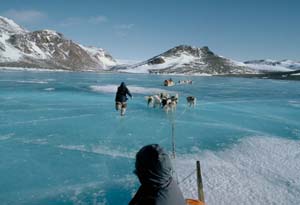In This Issue....
*
A Nunavik Adventure
*
In the News
*
Fan Mail
*
Tip for the Trail: Keep it Clean
*
Behavior Notebook: Displacement, Discipline, Diversion, Disarming
*
IMHO: Transitions
*
Index: Volume 8, The Fan Hitch
Navigating This Site
Index of articles by subject
Index
of back issues by volume number
Search The
Fan Hitch
Articles
to download and print
Ordering
Ken MacRury's Thesis
Our
comprehensive list of resources
Talk to The Fan Hitch
The Fan Hitch
home page
ISDI
home page
Editor-in-Chief: Sue Hamilton
Webmaster: Mark Hamilton
Print Edition: Imaged and distributed by the IPL students of the Ulluriaq School, Kangiqsualujjuaq, Nunavik
Print subscriptions: in Canada $20.00, in USA $23.00, elsewhere $32.00 per year, postage included. All prices are in Canadian dollars. Make checks payable in Canadian dollars only to "Mark Brazeau", and send to Mark Brazeau, Box 151 Kangiqsualujjuaq QC J0M 1N0 Canada. (Back issues are also available. Contact Sue Hamilton.)
The Fan Hitch welcomes your letters, stories, comments and suggestions. The editorial staff reserves the right to edit submissions used for publication.
Contents of The Fan Hitch are protected by international copyright laws. No photo, drawing or text may be reproduced in any form without written consent. Webmasters please note: written consent is necessary before linking this site to yours! Please forward requests to Sue Hamilton, 55 Town Line Rd., Harwinton, Connecticut 06791, USA or mail@thefanhitch.org
The Inuit Sled Dog International
The Inuit Sled Dog International (ISDI) is a consortium of enthusiasts whose goal is the preservation of this ancient arctic breed in its purest form as a working dog. The ISDI's efforts are concentrated on restoring the pure Inuit Dog to its native habitat. The ISDI's coordinators welcome to your comments and questions.
ISDI Coordinator Canada:
Geneviève Montcombroux, Box 206, Inwood, MB R0C 1P0; gmontcombroux@gmail.com
ISDI Coordinator USA:
Sue Hamilton, 55 Town Line Road, Harwinton, CT 06791, mail@thefanhitch.org

Photo: Nunavut Tourism
Traditional Knowledge and Skills Disappearing
There has been yet another acknowledgement that a part of Inuit culture is endangered. In a Canadian Broadcasting Company (CBC) July 31, 2006 story, Knowledge of land being lost, Inuit elders fear, Inuit elders say that their younger generation does not have the skills to live on the land. They don't know how to hunt, how to read the ice and the weather, how to eat, keep warm... how to survive.
Now that traditional Inuit knowledge been accepted as valid information by the modern scientific community, the ability to use and apply it is endangered of being lost because Inuit youth are not being taught the basic skills so they can go out on the land. Officials suggest that parents and elders get more involved in this education, but that there should be an even greater effort to teach these skills in the schools.
Whizzing along on the ice on a snowmachine may not be ideal, however, and the ISDI suggests that rekindling the time-honored travel by dog team would enhance the traditional experience and understanding and help integrate all the elements of knowledge and culture that many fear are now being lost. Of course, The Fan Hitch readers know that this is already underway in Nunavik ("Developing a Culture of Mushers", Volume 8, Number 3). More and more it seems as if there ought to be and is a place and a real need for the return of the Inuit Sled Dog to the North, not just to prevent its own extinction, but that of these other traditions as well which are now being mentioned with more frequency. Hopefully many more programs to save all these endangered traditions will be well established across the Arctic before the only place they can be learned about is in big glass museum display cases and as wax figures or taxidermy mounts in their dioramas.
Veterinary School Visits Kimmirut
In another CBC News story on August 14, 2006 some very encouraging news was reported. In August, a team of veterinarians and veterinary students traveled from Atlantic Veterinary College on Prince Edward Island, Canada to Kimmirut on the southern coast (Hudson Strait) of Baffin Island, Nunavut. The hamlet's residents, young and old, were invited to watch as their dogs were examined, treated for parasites, vaccinated and even neutered in the makeshift clinic, set up in the community school kitchen. The Chinook Project, as the program is known, was the first time future vets had the eye-opening opportunity to experience a different dog-owing culture, where the animals are working dogs, not pets.
Funding is in place for a 2007 clinic somewhere in the North and the vet school hopes to make this an annual event beyond next year's plans. The ISDI shares this hope, and would like to see more veterinary schools get similarly involved and include other services, such as presentations on the importance of vaccinating, basic emergency medical training for dog team owners and providing access to items such as wound closure staplers, antibiotics and other useful basic supplies. During their visits to northern communities, veterinary medical professionals could serve as collaborators to distant scientists doing DNA research studies now underway. And veterinary students who participate in these mobile clinics could be encouraged to engage in their own research projects, such studying the physiology of working dogs who endure the challenges of living in the harsh polar climate.
A trip to the North is an event that can be "infectious". At the very least, we hope these young veterinarians-to-be will long remember their experience, understand the real need for veterinary care in these remote places and consider spending a part of their careers in the Arctic where their serviced are needed.